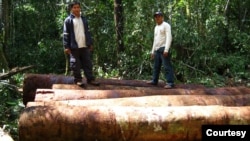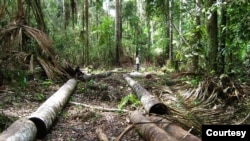Ivan Brehaut was 8 years old when he first visited the Amazon with his father. In the South American rainforest, he found his childhood heroes among the missionaries, who glowed with excitement from their adventures.
But when Brehaut returned as a forestry sciences student at age 21, he found a very different scene.
This Amazon was much more dangerous due of the activities of criminal organizations and the Peruvian insurgent group "Sendero Luminoso," or "Shining Path." Plus, there was a general lack of governmental authority across the territory, which spans Colombia, Peru and Brazil.
Brehaut left forestry science for journalism in 2006 and now works with the Peruvian news website La Mula. He is still drawn to the region.
"For the past 30 years, I've been traveling back and forth in the Amazon, and I love what I do," Brehaut told VOA.
Brehaut reports on illegal mining, fishing and logging; drug trafficking; and the human rights violations resulting from those activities.
A grant from the Rainforest Journalism Fund has helped drive his reporting on environmental crimes in the Ucayali region of Peru. He has also collaborated with a group focused on Indigenous media and communications.
"Many things that are happening are vastly underreported," Brehaut said. "The growth of mostly drug trafficking-based unlawful enterprises and the illegal exploitation of resources is rampant."
He says crimes affecting the region are nearly always linked to violations of human rights, including forced labor, human trafficking and even murder.
"There is organized violence, and these are disputed territories between organizations from Brazil, Colombia, as well as some Peruvian groups," he said. "International efforts are insufficient to address such a complex issue."
Making up more than half of the world's tropical rainforest, the Amazon is one of the world's most biodiverse regions, with about 30,000 plant species alone. It also plays a crucial role in global climate regulation by absorbing carbon dioxide, a heat-trapping greenhouse gas, from the Earth's atmosphere.
About 34 million people call the Amazon home. Of those, around 9% are from native communities, according to data from the Development Bank of Latin America and the Caribbean.
The Amazon, however, can be a hostile habitat for the journalists covering the environmental and climate change issues that are shaping it. A report published by the media watchdog the International Press Institute in February found that globally, reporters investigating these issues encounter violence, arrest, and legal and online harassment.
Adding to the danger are "illegal actors" with "unchecked power" ruling remote areas and attacks on journalists going unprosecuted, the report found.
Brehaut says he has been threatened for his reporting. Now he remains constantly alert to risks to his safety.
"In five years living in one site in the Amazon, I've moved four times," he said.
Brehaut's experiences are like those of two journalists who covered the Amazon from Colombia, who also told VOA about the threats they face for their work.
Both asked to remain anonymous because of the safety concerns.
"There is no security for journalists or media outlets that want to investigate," one of the journalists said. "It means risking our lives to tell a story that needs to be seen."
Threats can also come through online harassment and smear campaigns, Brehaut said. Assailants, he said, "defame environmental activists, Indigenous leaders, anyone who opposes fraudulent practices, polluting practices, abuses committed from positions of power, from companies."
The journalists say covering these environmental stories means balancing the need to expose wrongdoing with personal safety.
Brehaut says he lives far from his children and keeps a low profile on social media.
"You have the dilemma: On one hand, there is a group of communities whose security, whose future is at stake due to the threat of an illegal activity, such as drug trafficking," he said. "And on the other hand, it's me, the one investigating, publishing, denouncing."
His commitment, Brehaut said, comes from the legacy he wants to leave his children.
"I cannot shy away from the social commitment inherent in journalism, nor could I tell my 12 and 14-year-old children, 'Fight for what you believe in, struggle for your ideals, be firm and dignified if I don't do it myself,'" he said. "That is what I try to do: I fight for them."
This article originated in VOA's Spanish Language Service.





